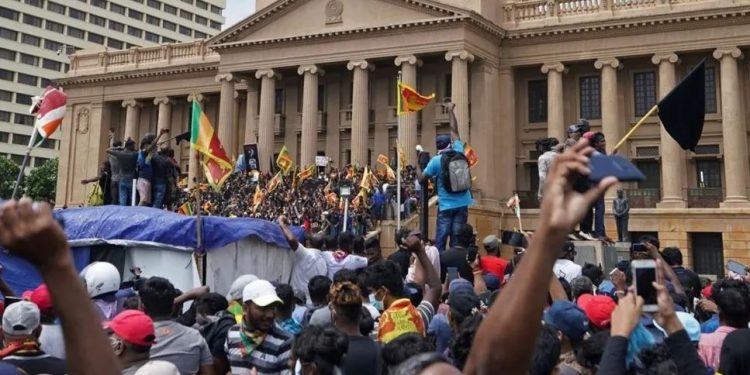By Miguel Lamas, an IWU-FI leader
12 July 2022.
Sri Lanka is today at the flashpoint of the world capitalist crisis. On 9 July a gigantic demonstration, with hundreds of thousands of people coming from all over the country, took over the presidential house, and thousands more set fire to the prime minister’s house. Both had escaped and are in hiding in some military base. A few hours later, President Gotabaya Rajapaksa and his prime minister announced their resignation this week.
The huge crowd arrived in the capital, Colombo, called by the trade unions. Many marched on foot for several days, because there is almost no transport or fuel on the island.
The great popular rebellion has been going on for over 3 months now, with general strikes and mass demonstrations. It started on 31 March, called by the workers’ unions, peasants’ and students’ organisations, in the face of the economic disaster that the working people are living through.
The international capitalist crisis has made food and fuel prices more expensive, the foreign debt with China, Europe and the USA has become unpayable, and the capitalists are taking their dollars out of the country, the state has been left without foreign currency (a familiar path in other countries). And in the last few months, it has not even been able to buy fuel and other imported products. Public transport has stopped running, petrol is not sold, electricity and gas are cut off, there are no basic medicines. Many workers have been laid off or suspended without pay.
Sri Lanka is an island of 65,610 km2, located south of India, with 22 million inhabitants. In addition to its traditional agricultural exports of tea, coconut, coconut oil and rice, in the last 20 years, like other Asian countries, it has become a major exporter of textiles, with companies associated with multinationals, with very cheap labour. Today it is called “the world’s bra factory”. Before the current crisis, rampant inflation and devaluation of the rupee, textile workers (350,000) used to earn 62 dollars a month, now even less.
According to the constitution, a new interim president should be appointed by parliament this week.
Leaders announced that they will not leave the government palace until Rajapaksa is out of power. Others said that they not only demand the departure of the current rulers but that a total change of the political system and another economic plan to protect the people is necessary. The IWU-FI welcomes this great people’s rebellion. We believe that only a government of the workers’ unions and peasant and popular organisations, which have led the rebellion, is capable of taking the fundamental economic measures that will rescue the people from this capitalist disaster.













